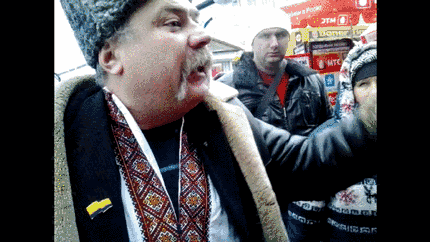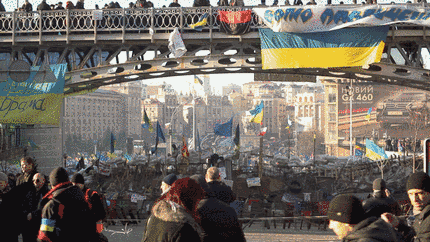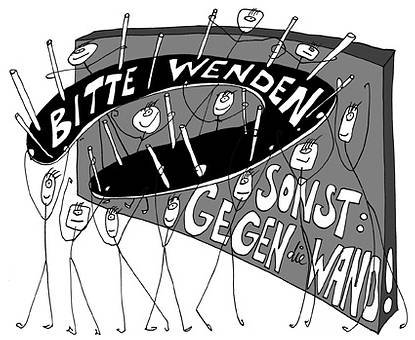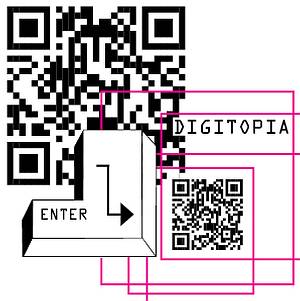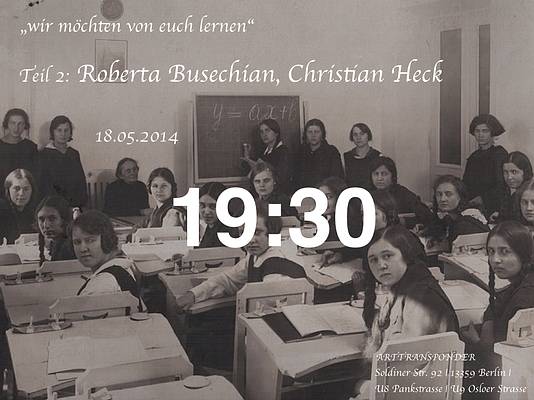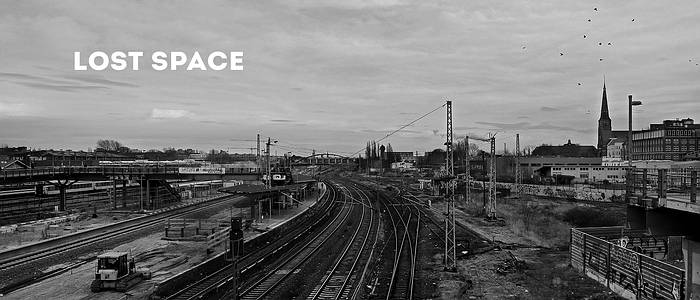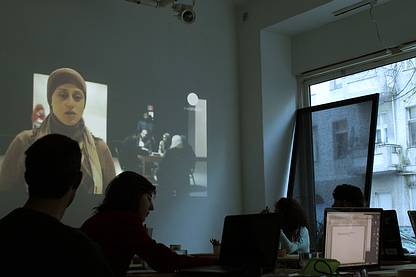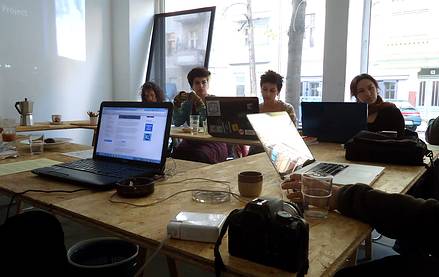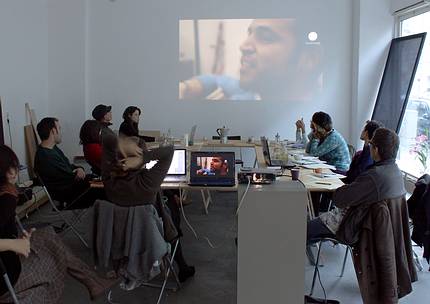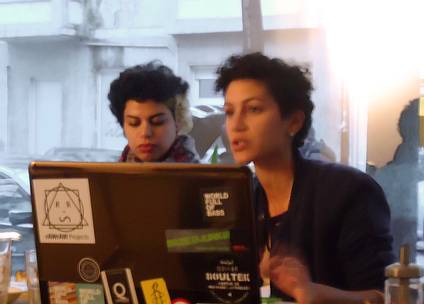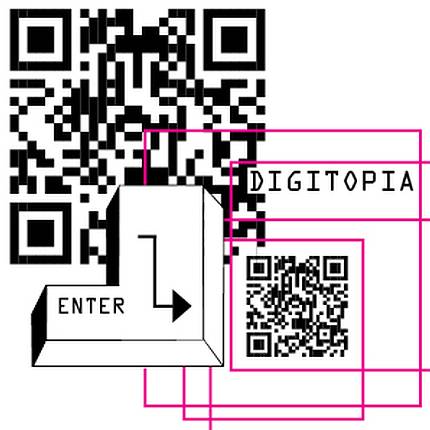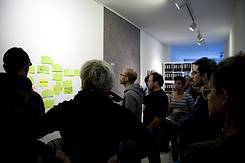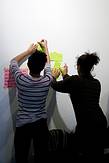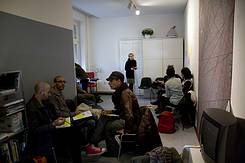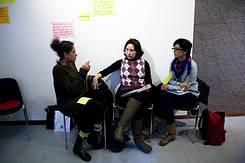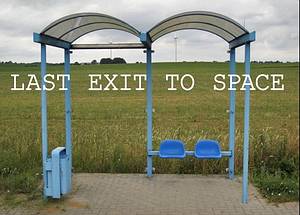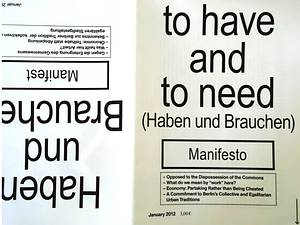 |
||||||||||||||||||||||||
RADICANT NETWORKS: Constructing Virtual Archives. The GI Press Project||| RADICANT NETWORKS invites | CROSS TALKS 5 04 February 2015 | 7pm Constructing Virtual Archives. The GI Press Project: history, lessons learned, and their application to other projects< Presentation and discussion with Dr. James Lewes, visiting researcher at the International Institute of Social History, Amsterdam, NL
IN COOPERATION MIT RADICANT NETWORKS LADEN WIR EIN
MITTWOCH 19 NOVEMBER | 19 Uhr
||| RADICANT NETWORKS & APARTMENT PROJECT invite you for
||| CROSS TALKS 4 |
(VISUAL) REVOLUTION OF THE MAIDAN: between Russian colonialism and Ukrainian nationalism || a lecture with Liza Babenko | screenings and further public discussion (in Englischer Sprache)
The lecture and screening of Liza Babenko's documentary learning films will be dedicated to the ideological, polity-economical and visual analysis of the Ukrainian Maidan revolution from the internal perspective. We will touch upon post-colonial and national reasons of the initial non-acceptance of this revolution by the South and Eastern parts of the country. Position of the Ukrainian –œOther–, which historically belonged to the Crimea and Donbass, will be problematised as an post-colonial evidence of broken into several national identities country. Besides, based on the researches of Ukrainian journal of social criticism Commons, Liza Babenko will discuss the necessity of actualization in nowadays post-Madian Ukraine such philosophical categories as nationalism, patriotism, fascism, national identity politics, post-colonial ressantiment and politics of memory concerning the Second World War. With the help of all this discursive instruments, but not only, we will try to understand the roots of the current war in Eastern Ukraine, except of the obvious Russian invasion and media propaganda. Also, we will look through such results of Maidan revolution, as activation of Ukrainian right-wing forces and regular change of the local oligarchic elites. All that will made us to raise the final question : whether the whole Ukraine, together with all its variety of national identity types, was needed in social revolution, but not in national one? And what is the political future of East European region in general?
||| Liza Babenko is an emerging researcher, author, artist, curator. Born in 1988, Ukraine, Babenko took her MA program in Philosophy of Culture at the Russian Anthropological School of the Russian State University for the Humanities (Moscow) and BA program in Cultural Studies at the Kiev-Mohyla Academy (Kiev). Among her recent activities there are graduation of the Victor Misiano's Moscow Curatorial School –œDoing Exhibitions Politically– (The V-A-C Foundation and What, How and For Whom curatorial collective), co-curating of the Feminist Workshop in collaboration with Boryana Rossa in the fridge & Haspel (Sofia), residence at the Centre of contemporary art Uyazdovsky Castle and participation in –œCommentators– exhibition within the Katarzyna Kozyra Foundation (Warsaw). Her last research and directing work is learning play "Energy of Cosmos Is Indestructible!!!" in collaboration with Anton Vidokle, Research Congress –œFormer West: Documents, Constellations, Prospects– at Haus der Kulturen der Welt (Berlin) http://www.formerwest.org/DocumentsConstellationsProspects/Contributions/EnergyofKosmosisIndestructible and co-working with the Russian experimental film director Svetlana Baskova (–œThere Is One Decision: To Fight). She is publishing in numerous magazines, among which there are ArtUkraine, Korydor, Springerin, Colta.ru, etc and constant contributor to the Ukrainian journal of social criticism Commons. Currently she is holding a fellowship from the Goethe Institute Ukraine and shooting her first feature-length learning film about the Ukrainian revolution and state war. She lives and works in Kiev.
|| –œMaidan: The Lost Revolution– video, HD, 28'39, Kiev, 2014 This short video is a documentary chronicl? of one of the many days lived by the author on heroic Maidan in 2014.Frozen panoramic plans alternate with the scenes from the everyday and already recognizable political as well as aesthetic reality of this one Ukrainian protest. But today, re-looking at all of these massively replicable visual images and ideological rhetorics of Maidan, we can try to imagine what was this revolution for residents of the East and South Ukraine, who did not accept neither the form nor the content of Maidan from the very beginning. In the midst of the war on Donbass we can also try to put for ourselves on the following questions: why this form of Maidan was so unacceptable for the other part of the country? Moreover, which type of revolution would unite Ukraine, but not split it up?
|| –œBanderovite–, video, 12'18, Kiev, 2013 This short documentary video was filmed in a working-class neighborhood of the Lukyanovska area in a time of winter Maidan in Kiev. At that time everything in the country was focused on the preparing for preterm elections to the parliament. The main character is representative of the Western Ukraine nationalist organization UNA-UNSO, which is close to the right-radical views Ukrainian party "Freedom and –œRight sector–. Such people are called by the Russian chauvinists and Russian-speaking residents of the Eastern regions of Ukraine –œbanderovites–. However, our hero is not a typical Ukrainian nationalist, but rather marginal, trickster of this revolution, agitating against all the corrupted parties and oligarchic candidates. At his campaign tent taking pace a dialogue with the passers-by. During the dialogue it become clear, that Maidan protesters are also quite different in their ideological positions, and that if fact they do not have uniting all of them political program, except of the will to expel the president V.Yanukovych. At the same time, for some Maidaners V. Yanukovych is "lesser evil" of Ukrainian politics, than –œall the rest–. In conclusion, –œbanderovite'', who is critical towards Yanukovich as well as to his opposition, is blamed in the breaking the opposition and collaborating with the president. But in fact, is it right?
||| LOCATION: Apartment Project Hertzbergstrasse 13 Berlin | 12055 Berlin S-Ring Sonnenalle Bus M41/Hertzbergplatz || U-Herrmannplatz Bus, M41/Hertzbergplatz
CROSS TALK sessions are initiated & organized by Tatjana Fell CROSS TALK 4 is friendly supported by APARTMENT PROJECT art space Berlin for interdisciplinary art projects & partnerships ||| www.apartmentproject.org
RADICANT NETWORKS is an interdisciplinary exchange, research and cooperation platform for contemporary art practice & critical discourse ||| www.radicant-networks.net
RADICANT NETWORKS aim is to capture the complexity of art & cultural production generated by artists working multi-professional and on an interdisciplinary level and which are frequently ore temporary on a cross-country move. With a range of different formats like interviews, presentations, articles and workshops RADICANT NETWORKS explores and researches the possibilities of generating and linking contextual scopes between the trajectories of a continuous shifting context. Radicant Networks reveals potentalities, the richness of multi layered perspectives and their value by irradiating similar or overlapping concerns, themes and visions within the art field. RADICANT NETWORKS reflects but also quest mechanisms of art production within its social, cultural, political and theoretical contexts. To share and produce knowledge about these issues and to open the collected data to a wide public is a main pillar of our work. RADICANT NETWORKS is a project initiated 2011 by Tatjana Fell
arttransponder unterstützt den folgenden Event
20. OKTOBER 2014 /// 18 UHR /// HABEN UND BRAUCHEN LÄD EIN
des Konzepts für einen längerfristigen Dialogprozess zwischen freien und institutionellen Akteuren der zeitgenössischen Kunst und dem Berliner Senat
Seit 2011 fordert Haben und Brauchen einen offenen kulturpolitischen Dialog zur Situation und Zukunft der Produktion und Vermittlung zeitgenössischer Kunst in Berlin. Mit der Bildung des Jour Fixe Bildende Kunst auf Anraten des Rats für die Künste im November 2013 und der Beauftragung von Haben und Brauchen und bbk berlin, ein Dialogkonzept zu entwickeln, hat die Senatskanzlei – Kulturelle Angelegenheiten einen solchen Weg nun eingeschlagen. www.facebook.com/HabenUndBrauchen
OPEN SOURCE / PURE DATA WORKSHOP Sonntag 15. Mai 19.30 Uhr " WIR MÖCHTEN VON EUCH LERNEN" , Teil 2
Christian Heck spricht über FLOSS (Free Produktionsmittel und Verhältnisse, die eine Dezentralisierung erlauben und eine social sculpture entstehen lassen können. Konzepte und Beispiele zu code art (code poetry / glitch art), anonyme und autonome Produktion, werden vorgestellt.
Konzept & Organisation: Zofia Nierodzinska und Veronika Albrandt "LOST SPACES" EXHIBITION PROJECT installation | photography | objects | video | interactive media
artists: Penelope Vlassopoulou, Alessandra Sensei, Marco Ristuccia, Julia Patey, Margarita Novikova, Stephanie Neumann, Carolin Kastner, Bram Braam, Rebecca Agnes concept / curating by Susanne Lek (NL)
OPENING 27th of MARCH | 7 - 11pm OPENING TIMES Friday / Saturday / Sunday 3pm - 7pm LOCATION JOAO COCTEAU Kienitzer Strasse 98, Neukölln
Most cities have an amazing amount of vacant, unused land in its downtown core. Over the past few years, radically changing economic, industrial and employment patterns have further exacerbated the problem of lost space in the urban core. This is especially true along highways, rail road lines and waterfronts, where major gaps disrupt the overall continuity of the city form. However, lost spaces, although underused and deteriorating, provide exceptional opportunities to reshape an urban center and counteracts sprawl and suburbanization. While the residential areas in the former East of Berlin experience massive urban upgrading, leading to gentrification, the former West is filled with deserted areas and empty buildings. The Kurfürstendamm, once a trademark of West-Berlin's welfare, lost its appeal.The area around it is now full of wasteland. This contrast between on lost spaces on one hand, and highly gentrified districts on the other, can be confusing for people not from Berlin. The group show reflects artistic viewpoints on this contradictions. How do outsiders experience the loaded history? How can someone keep up with a city that is changing so fast? How can artist help by turning this lost, dystopic spaces into utopian, creative sights? These and more questions will be raised and reflected in this exhibition.
SUSANNE LEK is doing her masters in contemporary and modern art history at University Utrecht, The Netherlands. She is currently finishing her thesis about the subject of dystopia in the work of contemporary Dutch artists. During her ERASMUS grant in Berlin she works at arttransponder within the frame of an internship
IN COOPERATION MIT RADICANT NETWORKS LADEN WIR EINWEDNESDAY 6th NOVEMBER | 2pm - 6pm
||| RADICANT NETWORKS & APARTMENT PROJECT invite you for a
||| ROUND TABLE & WORKSHOP | on the challenges of cultural organizations artists in Arab countries and Germany (in Englischer Sprache)
Deena Abdelwahed: Tunis/Tunesia
The round table is proposing a debate around the actual situation of the cultural independent institutions in the Arab countries and in Germany:
The round table raises the following questions:
Marwa Helmy, born in 1979, completed a Bachelor's degree in French literature at Ain Shams University in Cairo, received a diploma in journalism at the Centre de Perfectionnement des Journalistes (Paris) in 2007 and then received her Master's degree in cultural and media management at Senghor University in Alexandria in 2009. She presently lives and works in Cairo. She is the deputy manager of the not-for-profit organization Al Mawred Al Thaqafy, which supports the work and networking of artists in the Arabic world. She is also the manager of the cultural policy program in the organization. She also gained professional experience for example as a program coordinator in the Jesuites Association in Cairo and as an editor and translator for French and Arabic for the Egyptian Ministry of Media and Communication. She is working currently on her PHD in cultural policies in the Arab region.
Deena Abdelwahed, was born in 1989 and lives in Tunis. She studied interior design at the Superior Institute of Fine Arts in Tunis. She designed furniture for the firm Woodstore and worked as an administrator for the Semia Achour gallery in La Soukra. She was a coordinator and cultural advisor for the second Festival des Esprits Libres Tunisiens for photography, music, cinema, dance and sculptural art in Gabès 2012. Deena Abdewahed worked as an artist herself, singing with the jazz funk band So Soulful. She is interested in the influence of art and culture on social processes.Our guests are currently participating in the cultural management training organized by Goethe institute in Berlin and Hamburg
Dina Kafafy was born in 1985 and lives in Cairo where she received her Bachelor's degree in integrated and communication management and art. She completed her Master's degree in Fine Arts at Wimbledon College of Art in London. She taught at the Department of Performing and Visual Art at the American University in Cairo and is presently working as programme coordinator and responsible for the residency programmes of the Townhouse Gallery.
Mirna Bamieh was born in 1983, studied Applied Arts in Egypt and received a Bachelor's degree in psychology and sociology in Ramallah. This year, she completed her Master's degree in Fine Arts at the Bezalel Academy for Arts and Design in Tel Aviv. She works as programme coordinator and curator for the Al Hoash Gallery in Jerusalem, which promotes and exhibits visual art by Palestinian artists. When Jerusalem was named the Arabic Capital of Culture in 2009, Mirna Bamieh was responsible for coordination of events.
||| LOCATION: Apartment Project Hertzbergstrasse 13 Berlin | 12055 Berlin S-Ring Sonnenalle Bus M41/Hertzbergplatz || U-Herrmannplatz Bus M41/Hertzbergplatz
The round-table is organized by Tatjana Fell with the friendly support of Selda Asal & Apartment Project
RADICANT NETWORKS is an interdisciplinary exchange, research and cooperation platform for contemporary art practice & critical discourse ||| www.radicant-networks.net
RADICANT NETWORKS aim is to capture the complexity of art & cultural production generated by artists working multi-professional and on an interdisciplinary level and which are frequently ore temporary on a cross-country move. With a range of different formats like interviews, presentations, articles and workshops RADICANT NETWORKS explores and researches the possibilities of generating and linking contextual scopes between the trajectories of a continuous shifting context. Radicant Networks reveals potentalities, the richness of multi layered perspectives and their value by irradiating similar or overlapping concerns, themes and visions within the art field. RADICANT NETWORKS reflects but also quest mechanisms of art production within its social, cultural, political and theoretical contexts. To share and produce knowledge about these issues and to open the collected data to a wide public is a main pillar of our work. RADICANT NETWORKS is a project initiated 2011 by Tatjana Fell
APARTMENT PROJECT art space Berlin for interdisciplinary art projects & partnerships
||| INFO VERANSTALTUNG ENTER DIGITOPIA | MEDIEN WORKSHOPS FÜR FRAUEN DONNERSTAG 19. DEZEMBER 16 - 18 Uhr
enter FLYER POSTKARTEN BROSCHÜREN enter FOTOGRAFIEREN MIT DER DIGITALEN CAMERA enter XING LINKEDIN enter BILDBEARBEITUNG enter EVENTS ERSTELLEN IN FACEBOOK enter BLOGS ERSTELLEN enter PORTFOLIOS AUF DVD enter SPEICHERMEDIEN DATEN EINBETTEN enter YOUTOUBE UND VIMEO enter JPG PNG GIFF EPS enter GOOGLE DOCS enter DOODLE SHEETS enter DATA PROCESSING enter WEBSITE OPTIMIERUNG SUCHMASCHINEN enter
arrtransponder veranstaltet im kommenden Jahr 2014 eine Reihe von Medienworkshops zur Förderung berufsspezifischer Kompetenzen im Umgang mit Computer und Internet. Das Projekt gibt Teilnehmerinnen Einblick in die Nutzungsvielfalt einer sich stetig verändernden Medienlandschaft. Enter Digitopia agiert lokal im Bezirk Wedding und bietet ein kostenfreies Kursangebot, dass sich gezielt an Frauen ab 45 Jahre wendet. Im Intensivtraining können technische Wissenslücken geschlossen werden, die während des Übergangs von analogen zu digitalen Medien oder familiär bedingten Arbeitspausen entstanden sind. ENTER DIGITOPIA veranstaltet in diesem Rahmen zusätzlich Lectures und Präsentationen zu thematischen Schwerpunkten. Wir laden ganz herzlich alle interessierten Frauen aus dem Wedding ein, um gemeinsam Interessen und Präferenzen für die kommenden Medien Workshops und Seminare auszuloten und sich über bestehende Erfahrungen auszutauschen. Eine Einführung in die Programminhalte gibt erste Gelegenheit Fragen und Wünsche zu äußern, die wir in die zukünftige Projektplanung einfließen lassen.
INFOS ZU ENTER DIGITOPIA WORKSHOPS UND LECTURERS hier Unsere website ist im Aufbau und wird ab Januar 2014 regelmäßig unter enterdigitopia@arttransponder.net zu finden sein
| | | ORT arttransponder | office Soldiner Str. 92 | 13359 Berlin
| | | NEWSLETTER BESTELLEN unter: enterdigitopia@arttransponder.net | | | | | | ENTER DIGITOPIA ist ein Projekt von arttransponder | | | KONZEPT & ORGANISATION Tatjana Fell gefördert mit den Mitteln des Landes Berlin und des ESF
CULTURE SCOPES BERLIN | 04. OKTOBER 2013
15 Künstler/innen und Kulturmanager/innen aus dem mittleren Osten und Nord Afrika besuchten am 04. Oktober arttransponder im Wedding um dort Einblick in die Arbeit unabhängiger Kunstinitiativen zu erhalten und sich mit Kolleginnen und Kollegen auszutauschen. Im Rahmen des Seminartags CULTURE SCOPES BERLIN - from contemporary art institutions, art initiatives to activist movements, gehalten von Tatjana Fell, wurden unter anderem Bedingungen und Ideen zu potentiellen Netzwerken erarbeitet und diskutiert die in den Heimatländern dortige Arbeit, die häufig unter schwierigen politischen Bedingungen und ohne finanzielle Unterstützung statt findet erleichtern und bereichern könnten.
Wortwedding, ArtLaboratoryBerlin und OKK Organ Kritischer Kunst ermöglichten im Anschluß einen Blick hinter die Kulissen, stellten ihre spezielle Formate, Arbeitsweisen und eigene Netzwerkarbeit vor und luden ein zu Austausch und Diskussion. An dieser Stellen einen ganz herzlichen Dank an Nicola Caroli, Chris de Lutz und Pablo Herrmann.
Der Besuch fand innerhalb des, vom Goethe Institut organisierten Fortbildungs & Austauschprogrammes für Kulturmanager/innen statt, dessen Partner auch arttransponder ist.
_______________________________________________________________ VERLEIHUNG DES PREISES FÜR UNABHÄNGIGE PROJEKTRÄUME UND KUNSTINITIATIVEN
LAST EXIT TO SPACE / HAU 1 / 18. SEPTEMBER 2013 arttransponder gratuliert den ausgewählten Projekten:
Altes Finanzamt –¢ Kreuzberg Pavillon –¢ KUNSTrePUBLIK –¢ LEAP –¢ Netzwerk-Projektraum –œHip Hop Stützpunkt mit From Here To Fame & Common Ground Gallery–œ –¢ uqbar e.V. –¢ Walden Kunstausstellungen e.V. Bustour und Event zur zweiten Preisverleihung Im September organisiert das Netzwerk zum zweiten Mal die Preisverleihung zur Auszeichnung künstlerischer Projekträume - und initiativen im Bereich Bildende Kunst der Berliner Kulturverwaltung. Dieses Mal mit einer großen, öffentlichen Abschlussveranstaltung.
_______________________________________________________________ HABEN UND BRAUCHEN // General Strategic Meeting
MITTWOCH 16- Oktober // 19 Uhr ORT: ExRotaprint Gottschedstr. 4 13357 Berlin http://www.habenundbrauchen.de/en/
______________________________________________________ arttransponder art context dialog mediation Brunnenstr. 151 | 10115 Berlin Fon +49(0)30-30642400 Do 12-17 ׀ Fr/Sa 14-19 info@arttransponder.net | www.arttransponder.net |
